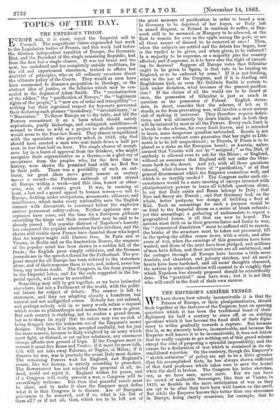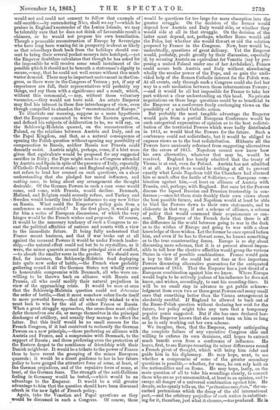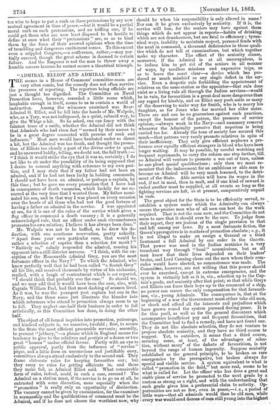THE EMPEROR'S ARRIERE PENSEE.
WEhave shown how utterly inconceivable it is that the Princes of Europe, or their plenipotentiaries, should flock together at the instance of the Emperor, bent on opening questions which it has been the traditional boast of their diplomacy for half a century to stave off, or on settling questions which it has become the fixed drift of their diplo- macy to widen gradually towards a rupture. But because this is, as we sincerely believe, inconceivable, and because the Emperor well knows it to be inconceivable, it does not folio* that he really expects to get nothing out of this grand scheme except the éclat of proposing a splendid impossibility, and the excuse for a declaration of war which is contained in its un- conditional rejection. On the contrary, though the Emperor's " sketch-estimates " of policy are apt to be a little grander than his accomplished facts, he has always shown sufficient of that hard prudence which takes care to save the kernel when the shell is broken. The Congress his letter sketches, can, as we have seen, never meet. For we can have no crowd of malleable Sovereigns, like that at Vienna in 1815, as flexible in the mere anticipation of war as they are apt to be after they have been well beaten on the anvil. But while the Emperor knows this better than any statesman in Europe, being clearly conscious, for example, that he would not and could not consent to follow that example of self-sacrifice—by surrendering Nice, shall we say ?—which he praises in England's surrender of the Ionian Islands, we may be tolerably sure that he does not think all favourable result a chimera, or he would not propose his own humiliation. Though a peaceable reconstruction of Europe by Sovereigns who have long been waxing fat in prosperity is about as likely as that schoolboys fresh back from the holidays should con- sent to bring their several pocket-moneys into hotchpot,—yet the Emperor doubtless calculates that though he has asked for the impossible he will receive some small instalment of the possible which it should not be beneath a statesman's dignity to secure,—nay, that he could not well secure without this much vaster demand. There may be important seats vacant in the Con- gress, as there were in the Congress of Verona ; yet, if any of importance are full, their representatives will probably say things, and say them with a significance and a result, which, without this ceremonial, — nay, without those voluntary vacancies,—they would not have said. An astute Emperor may find his interest in these free interchanges of view, even though compelled to abandon the " reconstruction of Europe." To illustrate our meaning, suppose as a mere hypothesis that the Emperor consented to waive the Eastern question, and defined his subjects of deliberation to be, we will say, on the Schleswig-Holstein quarrel, on the reconstruction of Poland, on the relations between Austria and Italy, and on the Papal Kingdom, and that, as a natural consequence of opening the Polish question without opening any possibility of compensation to Russia, neither Russia nor Prussia could decently assist. Austria might, perhaps, come, if a hint were given that equivalents would be proposed for any suggested sacrifice in Italy; the Pope might send to a Congress attended by Austria and Spain in spite of the presence of Italy, especially if Catholic Poland were at stake; and England might, probably, not refuse to lend her counsel on such questions, on a clear understanding that she pledged her moral influence, and nothing more, to bring about any arrangement she thought desirable. Of the German Powers in such a case some would come, and some, with Prussia, would decline. Denmark, Holland, and Belgium could scarcely refuse, and Turkey and • Sweden would heartily lend their influence to any new fetter on Russia. What could the Emperor's policy gain from a conference so constituted ? In the first place, it would gain for him a series of European discussions, of which the very hinges would be the French wishes and proposals. Of course, it would be the necessary tendency of such a Congress to re- cast the political affinities of nations and courts with a view to the immediate future. It being fully understood that France meant business, and that if war broke out at all against the recusant Powers it would be under French leader- ship,—the natural effect could not but be to crystallize, as it were, the minor quarrels around the principal axis of conflict, —to absorb the smaller sores in the greater. We should soon find, for instance, the Schleswig-Holstein feud deploying into quite new order of battle,—the French view probably gathering round it all the German States not wholly averse to honourable compromise with Denmark, all who were un- willing to be thrown back on alliance with Russia and Prussia, all who could modify their natural prejudices in view of the approachinep crisis. It would be seen at once that the Schleswig-Holstein question could not determine the order of battle,—that it must somehow subordinate itself to more powerful forces,—that all who really wished to win must look to win by the aid of either France or Russia. When a great struggle approaches, the cross-fires must either defer themselves sine die, or merge themselves in the principal discharges of artillery, and usually they manage to effect the latter. But this itself would be no small success for the French Congress, if it had contrived to reclassify the German Powers on a new principle,—those preferring an alliance with Austria and France, and a compromise with Denmark, to the support of Russia ; and those preferring even the protection of the Eastern despot to the semblance of friendship with their Danish neighbour. It would be a tribute to the power of France thus to have recast the grouping of the minor European quarrels ; it would be a direct guidance to her in her future policy to have gauged the attractive force of some, at least, of the German prejudices, and of the repulsive force of some, at least, of the German fears. The strength of the anti-Gallican feeling in Germany would be tested,—which would be an advantage to the Emperor. It would be a still greater advantage to him that the question should have been discussed afresh in the new light of French policy.
Again, take the Venetian and Papal questions as they would be discussed in such a Congress. Of course, these would be questions fur too large for mere absorption into the greater struggle. On the decision of the former would depend how Austria and Italy would side, or whether they would side at all in that struggle. On the decision of the latter must depend, not, perhaps, whether Remo would aid. the Poles, but whether she would thwart or aid the solution proposed by France in the .Congress. Now, here would be, undoubtedly, questions of great delicacy. Yet the Emperor would, probably, profit greatly by their discussion, especially if, by securing Austria an equivalent for Venetia (say by pro- posing a united Poland under one of her Archdukes), France could secure both Austria and Italy without abandoning wholly the secular power of the Pope, and so gain the undi- vided help of the Roman Catholic interest for the Polish war. At all events, only through such a Congress could she feel her way to a safe mediation between these inharmonious Powers ; —and it would be all but impossible for France to take her part without a clear understanding on this head. No private negotiations on these large questions could be so beneficial to the Emperor as a conference freely exchanging views on the possibility of a united Catholic action.
But probably the most tangible advantage the Emperor would gain from a partial European Conference would be such categorical expressions of opinion as to the best redistri- bution of the territorial Powers which were badly distributed in 1815, as would bind the Powers for the future. Such a conference could not redistribute, but it would be obliged to express views as to the best redistribution. Hitherto all the Powers have anxiously refrained from suggesting alternatives for the errors of 1815. Napoleon cannot now know how his own alternative, whatever that may be, would be received. England has barely admitted that the treaty of Vienna is at end, even for Poland. Austria has not admitted it at all. As yet there would bo nothing at all to prevent exactly what Louis Napoleon told the Chambers had alarmed him so much after the battle of Solferino,—a European com- bination against him,—at least an alliance of Austria with Prussia, and, perhaps, with England. But once let the Powers discuss the lapsed Russian and Prussian trusteeship in con- ference ;—once let them state frankly their own views about the best possible future, and Napoleon would at least bo able to bind the Powers down to their own statements, and to elaborate in that way, if not a scheme of alliance, a scheme of policy that would command their acquiescence or con- sent. The Emperor of tho French feels that there is all the difference in the world between going to war in the dark as to the wishes of Europe and going to war with a clear knowledge of those wishes. Let the former be once spread before him, and even if he has to thwart some, he knows something as to the true counteracting forces. Europe is so shy about discussing mere schemes, that it is at present almost impos- sible to tell how the elective affinities would group the various States in view of possible combinations. France would gain a key to this if she could but set four or five important Powers discussing alternative guarantees for the antiquated guarantees of 1815. That the Emperor has a just dread of a European combination against him we know. Where Europe would begin to be actively jealous of his influence he does not know, and wishes, accordingly, to cast his sounding-lines. It will be no small step in advance to get public acknow- ledgment from even two or three great Powers and many small ones that something better than the Vienna arrangement is absolutely needful. If England be allowed to back out of the Russo-Polish question without declaring her wish for the future, her policy might take any turn that a temporary popular panic suggested. But if she has once declared her- self, the Emperor knows that she cannot turn on him so long as he is only working out her own scheme.
We imagine, then, that the Emperor, surely anticipating the complete failure of any executive Congress able and willing to enforce its own decisions, still hopes to extract much benefit even from a conference of influence. He hopes, first, to see Europe recasting its minor differences round a French pivot of thought, which will bring him éclat and guide him in his diplomacy. He may hope, next, to see whether a compromise of some of the greater secondary questions is possible,—whether, for once, he can rely both on the nationalities and on Rome. He may hope, lastly, on the main question of all to take his soundings clearly, to commit those who are as yet uncommitted, at least to an opinion, and to escape all danger of a universal combination against him. He dreads, as he openly tells us, the "pretentions sans frein," the un- curbed pretensions which the decay of the old international pact,—and the arbitrary prejudice of each nation in substitut- ing for it, therefore, just what it chooses, —has produced. He is too wise to hope to put a curb on these pretensions by any new mutual agreement in time of peace,—but it would be a partial moral curb on such pretensions, and no trifling one, if he could get those who are now least disposed to be hostile to define at once what their "pretensions " are, so as to bind them by the force of their avowed opinions when the time of trembling and dangerous excitement comes. To this extent even a crippled Congress,—a conference, rather,—may par- tially succeed, though the great scheme is doomed to certain failure. And the Emperor is not the man to throw away a humble success because he cannot secure a theatrical triumph.
































 Previous page
Previous page